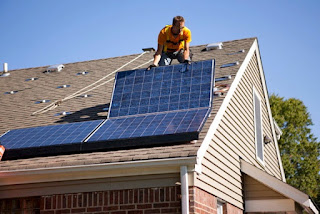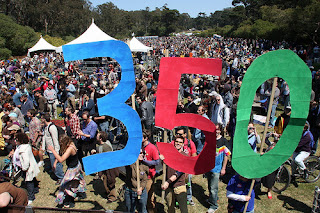Grid Connected Solar PV
This post is for Suzy:
Difficult for 140 characters, so please bear with me.
Grid connected solar is very easy to calculate.
Say your annual electricity consumption is 6,000 kWh and that the annual solar capacity factor (CF) where your home is located is 15%.
First, let's calculate your average power use:
Av Power Use = (6,000 kWh / 365 / 24)*1000 = 685 Watts.
How much solar installed capacity would you need to produce that average power =
685 / 15% CF = 4,567 W, or 4.567 kW. Let's round it off to 5 kW.
That's it! Easy!
Sure, during April you'll probably produce MORE energy than you need and the excess would be dumped into the grid, then in December you'll probably produce much LESS energy than you need and the grid will supply the difference. Let's say in April you produce 150% of your needs and during December only 20% of your needs. But the fact is you don't have to worry at all if the days are cloudy or short or long or if there is snow all over. The grid will guarantee that you will enjoy a constant supply 24/7/365.
Now, if you decided to disconnect from the grid it would be an entirely different and much more complicated situation.
The first question is, how much energy would you decide to store?
One day would be completely out of the question. Most certainly you would have to store weeks to have a somewhat reliable supply (see December).
To simplify (depending on the weather your consumption increases or decreases, usually the lowest consumption would be in Spring and Fall) let's consider every month you consume the same amount of electricity = 6,000 / 12 = 500 kWh. So to be somewhat on the safe side you pretty much would have to store one month of energy or 500 kWh (actually more, because there are efficiency losses both during the discharge of the batteries as well as in the power inverters).
This amount of batteries wouldn't be cheap or environmentally friendly and you'll need the space to store them protected from the weather.
However, there is another important drawback to disconnecting from the grid:
Even though your average consumption is only 685 W, at any particular moment (air conditioner + microwave + coffee maker + etc.) you could be consuming, say, 10 times that amount.
For the grid that is a no issue, but if you are independent then your inverters and batteries need to be able to supply those surges. Again, not cheap.
So, bottom line, technically it is (somewhat) feasible to wean yourself from the grid but it wouldn't make economic or even environmental sense.
Thank you!
Luis
Difficult for 140 characters, so please bear with me.
Grid connected solar is very easy to calculate.
Say your annual electricity consumption is 6,000 kWh and that the annual solar capacity factor (CF) where your home is located is 15%.
First, let's calculate your average power use:
Av Power Use = (6,000 kWh / 365 / 24)*1000 = 685 Watts.
How much solar installed capacity would you need to produce that average power =
685 / 15% CF = 4,567 W, or 4.567 kW. Let's round it off to 5 kW.
That's it! Easy!
Sure, during April you'll probably produce MORE energy than you need and the excess would be dumped into the grid, then in December you'll probably produce much LESS energy than you need and the grid will supply the difference. Let's say in April you produce 150% of your needs and during December only 20% of your needs. But the fact is you don't have to worry at all if the days are cloudy or short or long or if there is snow all over. The grid will guarantee that you will enjoy a constant supply 24/7/365.
Now, if you decided to disconnect from the grid it would be an entirely different and much more complicated situation.
The first question is, how much energy would you decide to store?
One day would be completely out of the question. Most certainly you would have to store weeks to have a somewhat reliable supply (see December).
To simplify (depending on the weather your consumption increases or decreases, usually the lowest consumption would be in Spring and Fall) let's consider every month you consume the same amount of electricity = 6,000 / 12 = 500 kWh. So to be somewhat on the safe side you pretty much would have to store one month of energy or 500 kWh (actually more, because there are efficiency losses both during the discharge of the batteries as well as in the power inverters).
This amount of batteries wouldn't be cheap or environmentally friendly and you'll need the space to store them protected from the weather.
However, there is another important drawback to disconnecting from the grid:
Even though your average consumption is only 685 W, at any particular moment (air conditioner + microwave + coffee maker + etc.) you could be consuming, say, 10 times that amount.
For the grid that is a no issue, but if you are independent then your inverters and batteries need to be able to supply those surges. Again, not cheap.
So, bottom line, technically it is (somewhat) feasible to wean yourself from the grid but it wouldn't make economic or even environmental sense.
Thank you!
Luis




Comments